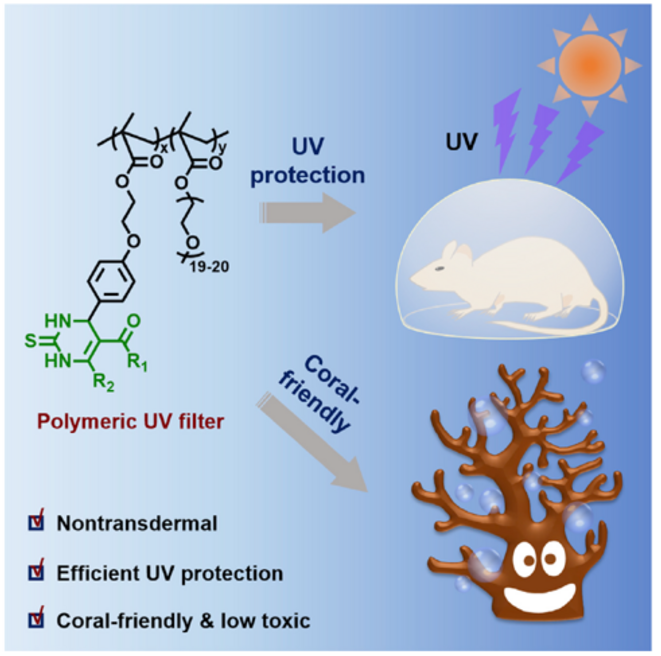Scientists created a prototype for coral reef-friendly sunscreens by polymerizing large molecules that still prevent UV radiation but are too large to infiltrate human skin, coral, and algae.

This is a graphical abstract depicting the new coral-friendly sunscreen and its properties. Image Credit: Zeng, et al.
The polymeric UV filter was more efficient than current sunscreens in blocking sunburn in mice. The study was published on March 1st, 2023, in the journal Cell Reports Physical Sciences.
This is an initial exploration of a new strategy to design bio-friendly and coral-friendly polymeric UV filters. We hope this leads to the next generation of sunscreens.
Lei Tao, Study Senior Author and Chemist, Tsinghua University
After visiting the Great Barrier Reef in 2010, Tao was motivated to investigate environmentally friendly sunscreens.
I was blown away by the beautiful coral, and ever since I learnt that sunscreen is one of the causes of coral bleaching, I kept thinking about ways to develop a coral-friendly sunscreen.
Lei Tao, Study Senior Author and Chemist, Tsinghua University
Tao’s group started by using a chemical reaction to generate random ring-shaped molecules with structures similar to avobenzone, an existing UV filter. Then, using a second chemical reaction, they linked these ring-shaped molecules together in various combinations, yielding a set of candidate polymers to choose from. The scientists selected the best candidate by contrasting the SPF value of the polymers and their ability to absorb UV radiation.
When the winning polymer was evaluated for its ability to prevent UV-induced skin burn in mice, the scientists discovered that it was clearly superior to oxybenzone, avobenzone, and two commercial sunscreens. It was noted that the mice did not take in the polymer through their skin, and no inflammation or other skin damage occurred.
The polymer UV filter also holds promise for coral and algae, two groups of organisms that are impacted by chemical sunscreens currently on the market.
When the researchers grew chlorella algae in the presence of small amounts of the polymer, it was unlikely to be affected, as were two common types of coral. These same corals bleached and died after being exposed to oxybenzone for 6 and 20 days, respectively.
The UV filter does not biodegrade given the structure of its chemical backbone, but the investigators claim that this is only the first step toward developing the next generation of environmentally safe UV filters.
We have some ideas for other non-random polymerization methodologies that we could combine with the chemical group that we developed in this study to create an environmentally friendly and readily biodegradable UV filter. Meanwhile, we will try to work with companies to test the current polymer and see whether it can be used in sunscreens.
Lei Tao, Study Senior Author and Chemist, Tsinghua University
Journal Reference
Zeng, Y., et al. (2023) Coral-friendly and non-transdermal polymeric UV filter via the Biginelli reaction for in vivo UV protection. Cell Reports Physical Science. doi.org/10.1016/j.xcrp.2023.101308.
Source: https://www.cell.com/